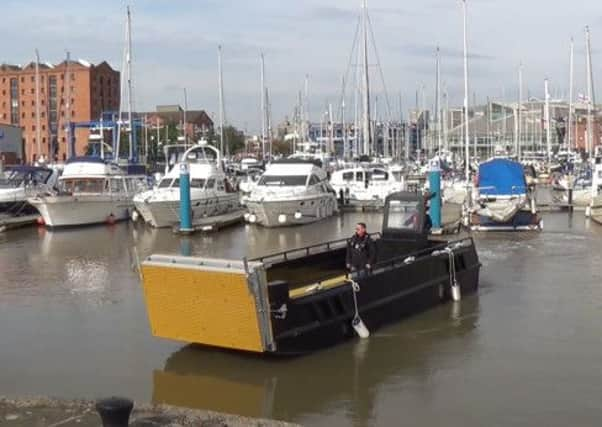Hospital boat aims to save lives n region where roads are few


Fundraisers hope the landing craft - Wilberforce 1 - which will be unveiled at Hull’s Freedom Festival later this year - will become a model for medical transport in a region where roads are often impassable or non-existent.
Women are still dying in childbirth and children from dirty drinking water because they can’t get medical help in time and people have to rely on unstable dugouts which can overturn in fast-flowing - and sometimes crocodile-infested - waters.
Advertisement
Hide AdAdvertisement
Hide AdCity firm Seahorse Marine will construct the boat to take nurses, midwives and doctors to 40 villages along the White Volta River in northern Ghana.
The project, sponsored by the Rotary Foundation and the Rotary Club of Hull Paragon and District, hopes to eventually provide more transport vessels to help villagers become more self-sufficient.
Tony Tait, director of the family firm, which has already supplied three ferries to cover the uncharted waters of Lake Volta, said: “If there’s a medical problem people have to travel to the medical centre which may mean travelling many miles over horrendous roads. They will be the hospital staff and kit on board which will be able to reach the villages which are all alongside the river.
“Everything is organised - the only thing left to do is to build the boat, deliver it and give a bit of training.”
Advertisement
Hide AdAdvertisement
Hide AdNorthern Ghana was once a key source of slaves who were sent to markets and then marched to the coast and resold to European traders.
David Murden, from the And Albert Foundation, which is behind the scheme, will be showing people round the prototype at an event at the Holiday Inn, Hull Marina next Wednesday. Mr Murden has been working on a wider project for two decades to transform old slave routes into modern transport routes, using a computer-based system which can educate villagers from primary school to university level.
He said: “We have the infrastructure, the doctors and the nurses and are training people to run this boat. Women in childbirth are trying to get to hospital by canoe and never making it. There are kids dying from river diseases because they haven’t clean water.
“It is something that has remained unchanged in areas where slaves once came from. I think we are under a moral obligation to put back what we started. I call it Wilberforce’s unfinished business.”
Advertisement
Hide AdAdvertisement
Hide AdThe boats, which are made from high-density poly-ethelyene, a material used form everything from hard hats to fuel tanks, will be unsinkable and indestructible, according to the firm.
The landing craft will be able to drive up to a river bank, drop its bow ramp allowing the medics will be able to drive straight off on their motorbikes to attend an emergency.
The firm is only one of six in the world to use the material for boatbuilding and is currently working on nine boats to serve fish farms in Scotland and Orkney.
“Whether the river is in flood or running very low they will be able to get up to the villages and use the bow ramp to bring people on board on stretchers,” added Mr Tait.